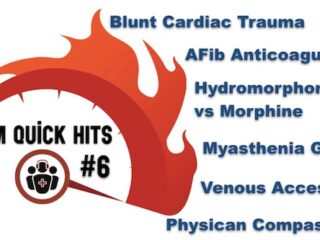Ep 145 Physician Compassion – The Barbara Tatham Memorial Podcast
Dr. Barbara Tatham, EM colleague and educator, died of metastatic sarcoma at the age of 32 in October 2019. During her last year of life, in between surgeries, ICU stays and rounds of chemotherapy and radiation, she gave lectures on compassionate care inspired by her journey as a patient. In August 2019 we met at my summer cottage to record this podcast. We explored the evidence that compassionate care improves patient outcomes and staves off physician burnout. We discussed how compassion can be learned and applied easily and efficiently in your practice. We talked about the do’s and don’ts of compassionate care and ended with a call to action. It is my hope that, through this podcast, her voice and vision will reverberate and she will continue to champion compassionate care into the future…





